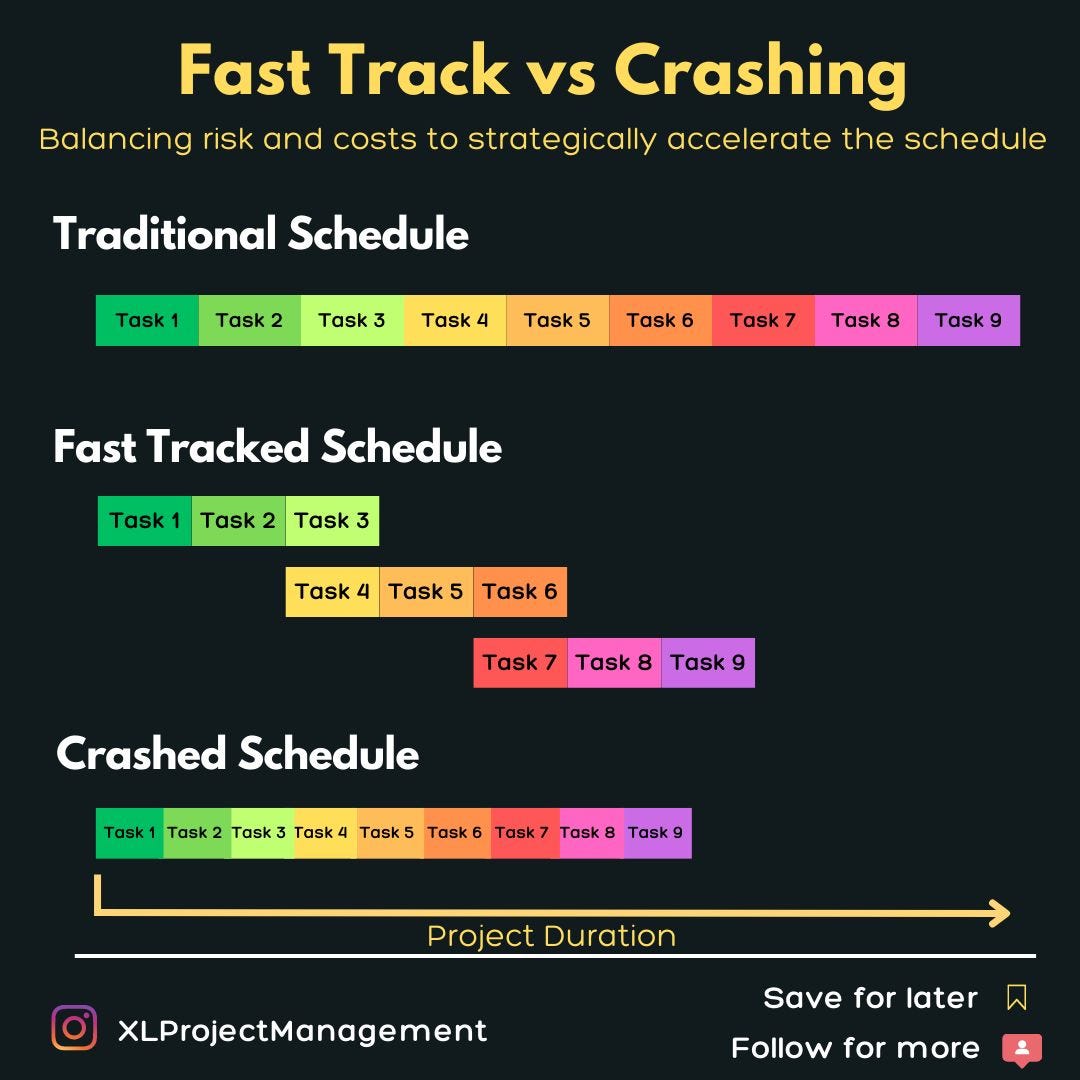Read on LinkedIn / Read time: 4 minutes
Welcome to The Agie Admiral weekly newsletter where I provide actionable ideas to help you build a high-performing Project Management career
Today at a Glance:
🌟 Quote of the week
📚 Fast Track vs Crashing
💡 What's new from PMI?
💼 Learning corner
✍️ Community - PMP Study Groups - Yes, there is more than one next week :-)
Quote on the need for boundaries:
"Daring to set boundaries is about having the courage to love ourselves, even when we risk disappointing others." - Brene Brown
If you say YES to everyone else, you're saying NO to yourself.
Learn to embrace the power of NO.
Fast Track vs Crashing
As a project manager, it's important to understand the difference between fast-tracking and crashing, two common techniques used to accelerate project schedules. Both methods aim to shorten the project duration, but they do so in different ways and have different implications.
Fast Tracking
Definition: Fast-tracking involves performing tasks that were originally planned to be done sequentially in parallel or partially overlapping.
How It Works:
Reordering Activities: You look at the project schedule and identify tasks that can be done simultaneously instead of one after another.
Overlap Phases: For example, you might start the construction phase before the design phase is completely finished, allowing some parts of the project to progress while others are still being finalized.
Advantages:
Time Savings: Can significantly reduce the project duration if activities can be safely overlapped.
Cost Neutral: Typically does not involve additional costs, although it may require more intensive coordination and management.
Disadvantages:
Increased Risk: Overlapping tasks can lead to rework if the earlier phase outputs are not satisfactory or if issues arise.
Complexity: Requires careful planning and more rigorous communication to ensure that overlapping tasks do not interfere with each other.
Crashing
Definition: Crashing involves adding extra resources to project activities to complete them faster.
How It Works:
Resource Addition: You add more resources, such as additional staff, overtime hours, or equipment, to the critical path activities to speed them up.
Trade-Off: This technique usually involves a trade-off between time and cost, as the additional resources come at a financial cost.
Advantages:
Time Reduction: Can effectively reduce project duration by focusing on critical path activities that directly impact the project's completion date.
Targeted Approach: Allows for a targeted approach to expedite specific activities without altering the entire project schedule.
Disadvantages:
Increased Cost: Generally incurs higher costs due to additional resources or overtime payments.
Diminishing Returns: There is a limit to how much crashing can accelerate a task; after a certain point, adding more resources will not yield proportional time savings and may even cause inefficiencies.
Summary
Fast Tracking:
Method: Performing tasks in parallel that were originally planned sequentially.
Cost: Generally cost-neutral, but can lead to rework if not managed carefully.
Risk: Higher risk due to potential conflicts and increased need for coordination.
Best Used When: Tasks can logically overlap without significant rework risks.
Crashing:
Method: Adding extra resources to speed up critical path activities.
Cost: Higher cost due to additional resources or overtime.
Risk: Financial risk due to increased budget, with potential for diminishing returns.
Best Used When: Specific activities need to be accelerated, and the budget allows for additional costs.
By understanding these differences, you can choose the most appropriate schedule compression technique for your project, balancing time, cost, and risk effectively.
What's new from PMI?
Reimagining the Role of the Project Manager
The mainstreaming of AI is transforming role of the project manager to one of strategic leadership. Get ready now by trying these easy generative approaches.
A type of “sea change” moment is happening in the project management profession. Project managers’ administrative workloads are shrinking. But far from replacing project managers with machines, these changes are likely to increase their value as strategic contributors within their organizations. The choices project managers make now will be game changing, but for some it will require a mindset shift, some upskilling—and a reorientation of what it means to be a project manager.
That’s why I’m sharing some simple generative approaches you can implement right now. Practicing these techniques will help broaden and deepen your organizational role. While the term “generative” is most often used in reference to artificial intelligence (AI), it simply means “having the power of originating or producing”, and there are many generative approaches that project managers can implement on as individuals, with stakeholders, or by leveraging AI.
Create Value by Asking the Right Questions
Continue reading here: article
How much time should I dedicate for PMP studies?
I receive this question every week.
There are a few principles which will help you clarify this point:
1. You cannot learn 100%
2. You cannot leave the exam with 100% results
3. You cannot study every day
4. and You cannot study 4 hours every day either
Here is my solution for you.
All this will be part of my upcoming PMP Operating System course - PMP OS
PMP OS = Weekly group coaching + Mock Test Simulator + Course(with all the know-how to reach 80-90% passing rate).
Feel free to contact me for more details.
Learning corner
📐 Personal development
🧨Leadership and management
How many friends do you really need at work?
The most agile day
Weekly PMP Study Groups
Date: July 2nd, Tuesday
Topic: Exam Content Review Part 1/3: People Domain
Host: Torge
Link to session: https://www.linkedin.com/events/pmpexamstudygroup-examcontentre7211452847152898048/
Date: July 4th, Thursday
Topic: Suprise :-)
Host: Gabor
Link to session: https://www.linkedin.com/events/pmp-weeklystudygroup-topic-tbd7207850041435144192/
In case you were not able to attend live, grab the recordings each week.
How? Opt for paid membership.
Find me on LinkedIn, YouTube, Udemy or Book a 1:1 Call
Want to learn more from me? Check this out:
🚧 FREE CAPM/PMP Exam Prep Flashcards - Update January 2024
🦸♂️ AGILE Mindset to PASS PMI Exam’s by 1st Try
📚 How to Study for CAPM & PMP Exams - (Free on YouTube)







